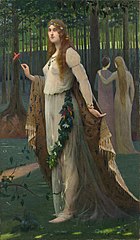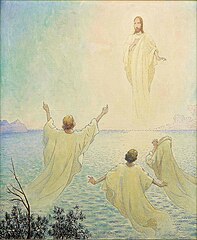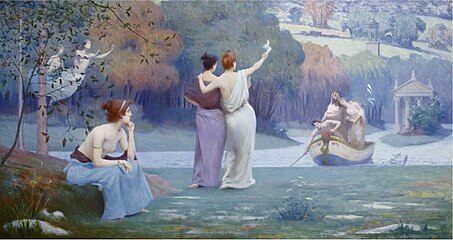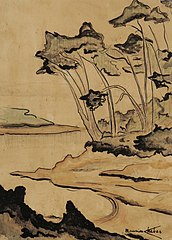Maurice Chabas
This article needs additional citations for verification. (September 2014) |
You can help expand this article with text translated from the corresponding article in French. (April 2009) Click [show] for important translation instructions.
|
Maurice Chabas (21 September 1862, Nantes – 11 December 1947, Versailles) was a French Symbolist painter.[1]
Biography
[edit]Chabas came from a family of painters. Being the eldest child, he had to take over the family business, although he was interested in painting. His younger brothers, Maurice and Paul, were renowned painters.[2]
Chabas was a prolific artist, and debuted his work in 1885 at the Salon, where he would continue to present his works until 1913. Chabas was also a sensitive and often mystical artist and participated in many Rosicrucian meetings in the 1890s. His reputation spreads and by 1895, is the subject of an exhibition at a gallery in Paris.
In 1900, Chabas moved to Neuilly-sur-Seine, where his studio became a hub for scholars like Camille Flammarion, Charles Richet, Maurice Maeterlinck, Léon Bloy, Lucien Lévy-Brulh, Joséphin Péladan, Edouard Schuré, and René Guénon. Until he moved to Neuilly-sur-Seine, Chabas was a little-known figure. That changed after 1900, when his popularity escalated.[2]
In 1910 he met the Belgian Gabrielle Storms-Castelot, and they had two children, the writer André Castelot and the actor Jacques Castelot. In 1917, he became a member of the Theosophical Society, although he also maintained friendships with leading Roman Catholic intellectuals such as novelist François Mauriac.[3]
In the last years of his life, Chabas mostly cultivated his personal mysticism and lived as a recluse. He died in solitude in his Versailles home on 11 December 1947.[4]
Gallery
[edit]-
Néméa, 1894
-
L'Apparition, circa 1900
-
L'Élegante dans l'Atelier, circa 1900
-
Return to Cythera, circa 1900
-
Reverie au Bord du Lac, circa 1900
-
Two Women in a Park, circa 1900
-
La chaste Suzanne, 1903
-
circa 1905
References
[edit]- ^ Benezit Dictionary of Artists
- ^ a b de Palma, Myriam. "Maurice Chabas". Art Experts. Retrieved 30 July 2013.
- ^ Myriam de Palma, Maurice Chabas, World Religions and Spirituality Project, April 10, 2017.
- ^ Myriam de Palma,Maurice Chabas (1862-1947), peintre et messager spirituel, Paris: Somogy 2009, 11-20.








